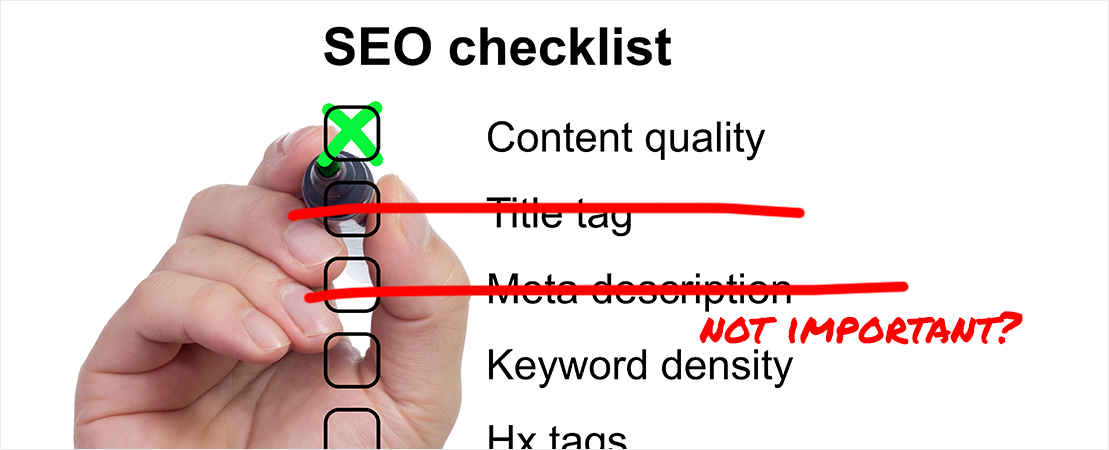As a Small Business Owner, performing well in the organic search results will likely be high on your priority if you’re wanting to achieve a strong Online presence. So much so in fact, that you could quickly become swept up in tweaking your Campaign, constantly altering Keywords and using any trick in the book to get you there. Unfortunately however, this could see you doing more harm than good to your Search Engine Optimisation (SEO) efforts.
Organic Search Engine rankings are comprised of a series of algorithms that take into account your Website’s Keywords, content, backlinks, user experience, and much more. And there’s so much to consider when it comes to optimising your Site for better SEO results that it can be overwhelming at times. But it pays to remember that Google is constantly updating its algorithms to ensure that Website’s displaying SEO bad practices don’t make it into the top-ranking positions.
So, if you’re guilty of tweaking your Campaign in the hopes that you’ll trick the system, or are even just making some harmless little changes to see what happens, read on. Because you just might discover that you’re completely sabotaging your SEO efforts.

1. Keyword Stuffing
When SEO was first established, stuffing as many Keywords into a Website’s content was common practice. Known as “Keyword Stuffing”, people used this as a way to make their content look more relevant to Google users, and therefore see them move up in the organic search results.
Google cottoned on pretty quickly to this technique however, creating an algorithm that actually punished Website’s that looked as though they were utilising this “black hat” technique. In reality, Google wants to offer its users the best and most respectable sources of information possible, and Website’s overflowing with awkward phrases stuffed with Keywords hardly fits this description.
For example, if you’re a physiotherapist in Balwyn, and have used the phrase “physiotherapist in Balwyn” a ludicrous amount within your Site’s content, your visitors will likely just get annoyed and bounce straight back to Google. That content is neither interesting to read, nor effective in building trust with visitors. And that’s why Search Engines will penalise Businesses that overload their Website with the same terms or phrases, and reward those that emphasise rich content that educates and engages visitors.

2. Disregarding the Importance of Meta Descriptions and Title
If you’re not familiar with Meta Descriptions and Title Tags, here’s a quick overview:
The Title Tag of your page is essentially what represents your Website in search results. It’s the clickable headline for a given result, and it should be an accurate and concise description of a page’s content. It’s also hugely important for usability and SEO results, which makes ignoring it a terrible mistake.
To rank highly on Search Engines, your Title Tags should be different according to the Web Page their connected to. Once again, you want your content to be informative, relevant and to make sense to both the user and the Search Engines.
The Meta Description is the text that appears under your Website in search results. It’s kind of a snippet of your page that can contain up to 320 characters. Meta Descriptions allow you to discreetly advertise that particular Web Page to users, so the more interesting and exciting it is, the more clicks you’ll likely receive. Write bland content, or engage Keyword stuffing techniques, and you’ll most certainly jeopardise your chances. Using he right Keywords effectively in your Meta Description will also help to boost your SEO ranking.

3. Not Having a Mobile-Friendly Site
Search Engine algorithms were updated in April of 2015 to ensure that preference of search result position was given to those Website’s which were optimised for Mobile usage. This means that if your Website doesn’t have this feature, your SEO is sure to suffer.
Nowadays, more than 60% of people search via Mobile and Tablet devices, seeing Search Engines deeming it as essential to possess a Mobile-friendly Site if you want to rank ahead of your competitors. Remember, Google wants to give its users the best possible Online experience, and in order for it to do this it needs to cater to its millions of daily Mobile users.
If you haven’t taken the time to update your Website and make it Mobile-friendly, you don’t want to wait much longer! If your visitors have to zoom in and out just to read the text, or can’t click where they need to, they’re probably going to seek out another resource with a better user experience.<

4. Choosing Quantity over Quality
One technique that became popular in an attempt to improve SEO rankings was to create a plethora of Web content in the form of blogs, Landing Page content and even creating multiple product and services pages. However, this kind of content generation won’t help your Website rank or be indexed in results. Google’s Panda algorithm was launched to combat this bad practice and will reduce rankings of Websites that use this strategy.
Once again this comes back to the user’s Online experience: if your Site isn’t offering engaging, interesting and relevant content to you visitor, Google will view this as a sign that your Site isn’t of value to its searchers. As a result, you’ll be punished with a lower Search Engine ranking.
While it might be appealing to create an overflow of content, if you’re a smaller business that only offers a few core products or services, creating fewer pages that contain high quality content will be much more beneficial. Not only will it be more appealing for your clients, it will also be more appealing to Search Engines.
Taking the time to write quality content that provides consumers with the information they need is well worth the effort, and goes much further than creating a plethora of Web Pages with minimal, bland content. Not only will your rankings benefit, but your Business and customer satisfaction likely will as well.

5. Not Keeping an Eye on your Website Analytics
Once you find that your SEO efforts are working and your Website is already ranking, it doesn’t mean you should stop there. Monitoring your Website analytics might sound like an impossible chore, but doing so is what will help you optimise your Campaigns. If you neglect this component, you’ll be doing yourself a great disservice.
Through assessment and analysis, you’ll be able to see which Keywords are most useful for your Website, which pages are most popular and which products are most purchased. In this way, you won’t only discover what’s working best for your Business, but you’re also going to see the areas that require improvement to step up your SEO game.
With so many algorithms and updates, it’s easy to fall into the trap of resorting to SEO bad practice in order to achieve high ranking in the Search Results Pages. But remember, you could actually be doing much more harm than good if you’re carrying out any of the above techniques.



